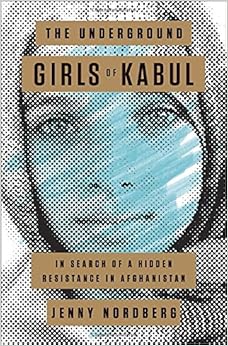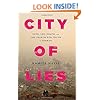
The Underground Girls of Kabul
and over one million other books are available for Amazon Kindle. Learn more


Flip to back
Flip to front

The Underground Girls of Kabul: In Search of a Hidden Resistance in Afghanistan Hardcover – Deckle Edge, September 16, 2014

$15.62
FREE Shipping on orders over $35.
In Stock.
Ships from and sold by Amazon.com.
Gift-wrap available.
NO_CONTENT_IN_FEATURE
Start reading The Underground Girls of Kabul on your Kindle in under a minute.
Don't have a Kindle? Get your Kindle here, or download a FREE Kindle Reading App.
Don't have a Kindle? Get your Kindle here, or download a FREE Kindle Reading App.
Choose Your Own Autobiography
Step right into Neil Patrick Harris's shoes in an exciting, interactive autobiography that places the reader squarely in the driver's seat. Learn more
Step right into Neil Patrick Harris's shoes in an exciting, interactive autobiography that places the reader squarely in the driver's seat. Learn more
Product Details
Would you like to update product info or give feedback on images?.
|
Editorial Reviews
Review
“Through extensive interviews with former bacha posh, observation of present ones and conversations with doctors and teachers, Nordberg unearths details of a dynamic that one suspects will be news to the armies of aid workers and gender experts in post-invasion Afghanistan.”–New York Times Book Review
“Jenny Nordberg has produced a striking and nuanced work that explores the current status of Afghan women through one of their subcultures...[A] finely written book.”–Washington Post
“Five years of intensive reporting have yielded this gritty, poignant, and provocative collage of intimate portraits…Nordberg conveys captivating nuance and complexity; just when you feel some kind of judgment or conclusive opinion is within reach, she deftly turns the tables, leaving us to reexamine our own prejudices and societal norms as we struggle with questions that are perhaps unanswerable.”–Elle
“Nordberg’s immersive reporting reveals an astonishingly clear picture of this resourceful, if imperfect, solution to the problem of girlhood in a society where women have few rights and overwhelming restrictions.”–The Boston Globe
“Nordberg’s book is riveting, bringing a practice previously unknown to the West to light, and continuing to elucidate the plight of Afghan women, whose supposed inferiority is so ingrained in their culture that Western feminism can make few inroads.”–Minneapolis Star Tribune
“Nordberg's intimate exploration leaves us rooting for her brave subjects.”–Mother Jones
“Nordberg creates a moving intimacy with these stories, weaving them into the bigger picture of contemporary Afghanistan. Diving deep into the lives and hearts of people who are usually ignored, she reveals the enormity of a localized struggle even while grounding it in broader human experience, never allowing the reader to reduce her subjects to curiosities.”–DallasMorningNews.com
“In clear, simple prose, Nordberg describes her encounters with several current or former bacha posh, including a nurse who kept the role until a month before her wedding, a tae kwon do instructor who now guides younger “underground girls,” and an adolescent still resisting being turned into a woman… The book raises provocative questions about gender roles in Afghanistan and beyond.”–The Columbus Dispatch
“In fluid narrative style, Nordberg explores the [bacha posh] phenomenon through compelling individual portraits… In addition to presenting a rare glimpse of Afghan life, The Underground Girls of Kabul explores the ways that gender identity is shaped and policed. Extending well beyond Afghanistan, this book compels the reader to rethink gender differences.”—Straight.com
“[A] searing exposé…Nordberg's subtle, sympathetic reportage makes this one of the most convincing portraits of Afghan culture in print.” –Publishers Weekly [starred]
“A stunning book… Nordberg has done some staggering work in this unique, important, and compelling chronicle. Book clubs will be riveted, and will talk for hours.” –Booklist [starred]
“As affecting as the stories of these women are, Nordberg’s conclusion—that women’s rights are essential to ‘building peaceful civilizations’—is the most powerful message of this compelling book. An intelligent and timely exploration into contemporary Afghanistan.” – Kirkus Reviews
“The Underground Girls of Kabul is a groundbreaking feat of reportage, a kaleidoscopic investigation into gender, resistance, and the limits of cross-cultural understanding. Jenny Nordberg is a riveting storyteller and she has an astonishing tale to tell.” –Michelle Goldberg, author of The Means of Reproduction: Sex, Power, and the Future of the World
“Jenny Nordberg has given us a fascinating look into a hidden phenomenon of extreme patriarchal societies: a form of gender-bending far riskier and more rewarding than Western academia's trendy, abstract gender categories. Nordberg's reporting is thorough and sensitive, her writing vivid and insightful. You will not forget this book; it will haunt you.” – Robin Morgan
“The Underground Girls of Kabul is a brilliant, urgent, groundbreaking work. It is a call to action, and a reminder that even under the greatest abuses of power women have found ways to fight and flourish. The inspiring story of the bacha posh is not just a tale of ingenuity and survival in Afghanistan. It is an excavation of the deep and insidious roots of global misogyny, and an offering of hope.” —Cara Hoffman, author of Be Safe I Love You
“The Underground Girls of Kabul is a riveting, firsthand account of what life as a girl is like in Afghanistan and how it often means becoming a boy. Jenny Nordberg has written a compelling and important work that exposes the profound gender prejudice that exists, in different forms, all over the world.” –Jennifer Clement, author of Prayers for the Stolen
“Forget everything you thought you knew about gender and what it means to be a woman or man. Jenny Nordberg’s exquisitely reported look at why Afghans choose to raise their girls as boys is nothing less than heartbreaking, mind-bending, and mesmerizing—not to mention timely.”—Lauren Wolfe, director of Women’s Media Center’s Women Under Siege
“Nordberg brings to light a world that no Afghan speaks of, but everyone knows: the world of girls raised as boys, usually until puberty. In a society where being a girl means living as chattel, and where families without boys are shamed, the bacha posh tradition arose, as it has in other highly patriarchal societies. Going deeper, Nordberg discovers that the bacha posh, once adults, become a subversive force: having tasted freedom and opportunity, these women can never go back. They stand up--for themselves, their daughters, and their country. The former bacha posh may yet change Afghanistan for the better . . . Nordberg’s book is a pioneering effort to understand this hidden world.” –Valerie M. Hudson, professor and George H.W. Bush Chair, The Bush School of Government and Public Service, Texas A&M University
“The investigation into bacha posh gives a new and unique perspective on the women’s situation, gender and resistance in Afghanistan. The author tells the story with empathy and respect for the women who have let her into their lives. This book will interest both those who want to learn about Afghanistan and those wanting to understand how gender works, and it is a must-read for both Afghanistan and gender specialists.” –Sari Kouvo, co-director of the Afghanistan Analysts Network
“The Underground Girls of Kabul is an amazing book. The fact that Nordberg brings this to light is eye-opening to everyone—even to Afghans. It is the truth that many Afghans live with it as part of their life.”–Naheed Bahram, program director of Women for Afghan Women
“Jenny Nordberg has produced a striking and nuanced work that explores the current status of Afghan women through one of their subcultures...[A] finely written book.”–Washington Post
“Five years of intensive reporting have yielded this gritty, poignant, and provocative collage of intimate portraits…Nordberg conveys captivating nuance and complexity; just when you feel some kind of judgment or conclusive opinion is within reach, she deftly turns the tables, leaving us to reexamine our own prejudices and societal norms as we struggle with questions that are perhaps unanswerable.”–Elle
“Nordberg’s immersive reporting reveals an astonishingly clear picture of this resourceful, if imperfect, solution to the problem of girlhood in a society where women have few rights and overwhelming restrictions.”–The Boston Globe
“Nordberg’s book is riveting, bringing a practice previously unknown to the West to light, and continuing to elucidate the plight of Afghan women, whose supposed inferiority is so ingrained in their culture that Western feminism can make few inroads.”–Minneapolis Star Tribune
“Nordberg's intimate exploration leaves us rooting for her brave subjects.”–Mother Jones
“Nordberg creates a moving intimacy with these stories, weaving them into the bigger picture of contemporary Afghanistan. Diving deep into the lives and hearts of people who are usually ignored, she reveals the enormity of a localized struggle even while grounding it in broader human experience, never allowing the reader to reduce her subjects to curiosities.”–DallasMorningNews.com
“In clear, simple prose, Nordberg describes her encounters with several current or former bacha posh, including a nurse who kept the role until a month before her wedding, a tae kwon do instructor who now guides younger “underground girls,” and an adolescent still resisting being turned into a woman… The book raises provocative questions about gender roles in Afghanistan and beyond.”–The Columbus Dispatch
“In fluid narrative style, Nordberg explores the [bacha posh] phenomenon through compelling individual portraits… In addition to presenting a rare glimpse of Afghan life, The Underground Girls of Kabul explores the ways that gender identity is shaped and policed. Extending well beyond Afghanistan, this book compels the reader to rethink gender differences.”—Straight.com
“[A] searing exposé…Nordberg's subtle, sympathetic reportage makes this one of the most convincing portraits of Afghan culture in print.” –Publishers Weekly [starred]
“A stunning book… Nordberg has done some staggering work in this unique, important, and compelling chronicle. Book clubs will be riveted, and will talk for hours.” –Booklist [starred]
“As affecting as the stories of these women are, Nordberg’s conclusion—that women’s rights are essential to ‘building peaceful civilizations’—is the most powerful message of this compelling book. An intelligent and timely exploration into contemporary Afghanistan.” – Kirkus Reviews
“The Underground Girls of Kabul is a groundbreaking feat of reportage, a kaleidoscopic investigation into gender, resistance, and the limits of cross-cultural understanding. Jenny Nordberg is a riveting storyteller and she has an astonishing tale to tell.” –Michelle Goldberg, author of The Means of Reproduction: Sex, Power, and the Future of the World
“Jenny Nordberg has given us a fascinating look into a hidden phenomenon of extreme patriarchal societies: a form of gender-bending far riskier and more rewarding than Western academia's trendy, abstract gender categories. Nordberg's reporting is thorough and sensitive, her writing vivid and insightful. You will not forget this book; it will haunt you.” – Robin Morgan
“The Underground Girls of Kabul is a brilliant, urgent, groundbreaking work. It is a call to action, and a reminder that even under the greatest abuses of power women have found ways to fight and flourish. The inspiring story of the bacha posh is not just a tale of ingenuity and survival in Afghanistan. It is an excavation of the deep and insidious roots of global misogyny, and an offering of hope.” —Cara Hoffman, author of Be Safe I Love You
“The Underground Girls of Kabul is a riveting, firsthand account of what life as a girl is like in Afghanistan and how it often means becoming a boy. Jenny Nordberg has written a compelling and important work that exposes the profound gender prejudice that exists, in different forms, all over the world.” –Jennifer Clement, author of Prayers for the Stolen
“Forget everything you thought you knew about gender and what it means to be a woman or man. Jenny Nordberg’s exquisitely reported look at why Afghans choose to raise their girls as boys is nothing less than heartbreaking, mind-bending, and mesmerizing—not to mention timely.”—Lauren Wolfe, director of Women’s Media Center’s Women Under Siege
“Nordberg brings to light a world that no Afghan speaks of, but everyone knows: the world of girls raised as boys, usually until puberty. In a society where being a girl means living as chattel, and where families without boys are shamed, the bacha posh tradition arose, as it has in other highly patriarchal societies. Going deeper, Nordberg discovers that the bacha posh, once adults, become a subversive force: having tasted freedom and opportunity, these women can never go back. They stand up--for themselves, their daughters, and their country. The former bacha posh may yet change Afghanistan for the better . . . Nordberg’s book is a pioneering effort to understand this hidden world.” –Valerie M. Hudson, professor and George H.W. Bush Chair, The Bush School of Government and Public Service, Texas A&M University
“The investigation into bacha posh gives a new and unique perspective on the women’s situation, gender and resistance in Afghanistan. The author tells the story with empathy and respect for the women who have let her into their lives. This book will interest both those who want to learn about Afghanistan and those wanting to understand how gender works, and it is a must-read for both Afghanistan and gender specialists.” –Sari Kouvo, co-director of the Afghanistan Analysts Network
“The Underground Girls of Kabul is an amazing book. The fact that Nordberg brings this to light is eye-opening to everyone—even to Afghans. It is the truth that many Afghans live with it as part of their life.”–Naheed Bahram, program director of Women for Afghan Women
About the Author
JENNY NORDBERG is an award-winning journalist based in New York. A correspondent and columnist for Swedish national newspaper Svenska Dagbladet, she has a long record of investigative reports for, among others, The New York Times, where she also contributed to a series that won the 2005 Pulitzer Prize for National Reporting. In 2010, she was awarded the Robert F. Kennedy Award for Excellence in Journalism for a television documentary on Afghan women. She is a member of the International Consortium of Investigative Journalists (ICIJ).
More About the Author
Jenny Nordberg is a New York-based foreign correspondent and a columnist for Swedish national newspaper Svenska Dagbladet.
In 2010, she broke the story of "bacha posh" - how girls grow up disguised as boys in gender-segregated Afghanistan. The front page story was published in The New York Times and The International Herald Tribune, and Nordberg's original research was used for opinion pieces around the world and inspired several works of fiction.
Her latest project, The Underground Girls of Kabul, to be published in ten countries in late 2014, reveals entirely new and previously unknown aspects of the practice and goes deep into the gender segregation and resistance among women in Afghanistan. Five years in the making, this cross-border investigation is described by Publisher's Weekly as "one of the most convincing portraits of Afghan culture in print." She is also developing bachaposh.com as an online resource for girls who have grown up as boys due to segregation.
Together with The Times' investigative unit, Nordberg previously worked on projects such as an examination of the American freight railroad system; a series that won the Pulitzer Prize for National Reporting, and U.S. efforts at exporting democracy to Haiti. She has also produced and written several documentaries for American television, about Iraqi refugees, Pakistan's nuclear proliferation and the impact of the global financial crisis in Europe.
In Sweden, Nordberg was a member of the first investigative team at Swedish Broadcasting's national radio division, where she supervised projects on terrorism and politics. Nordberg has won awards from Investigative Reporters and Editors, The Robert F. Kennedy Center for Justice and Human Rights and Föreningen Grävande Journalister.
Jenny Nordberg holds a B.A. in Law and Journalism from Stockholm University, and an M.A. from Columbia University's Graduate School of Journalism.
In 2010, she broke the story of "bacha posh" - how girls grow up disguised as boys in gender-segregated Afghanistan. The front page story was published in The New York Times and The International Herald Tribune, and Nordberg's original research was used for opinion pieces around the world and inspired several works of fiction.
Her latest project, The Underground Girls of Kabul, to be published in ten countries in late 2014, reveals entirely new and previously unknown aspects of the practice and goes deep into the gender segregation and resistance among women in Afghanistan. Five years in the making, this cross-border investigation is described by Publisher's Weekly as "one of the most convincing portraits of Afghan culture in print." She is also developing bachaposh.com as an online resource for girls who have grown up as boys due to segregation.
Together with The Times' investigative unit, Nordberg previously worked on projects such as an examination of the American freight railroad system; a series that won the Pulitzer Prize for National Reporting, and U.S. efforts at exporting democracy to Haiti. She has also produced and written several documentaries for American television, about Iraqi refugees, Pakistan's nuclear proliferation and the impact of the global financial crisis in Europe.
In Sweden, Nordberg was a member of the first investigative team at Swedish Broadcasting's national radio division, where she supervised projects on terrorism and politics. Nordberg has won awards from Investigative Reporters and Editors, The Robert F. Kennedy Center for Justice and Human Rights and Föreningen Grävande Journalister.
Jenny Nordberg holds a B.A. in Law and Journalism from Stockholm University, and an M.A. from Columbia University's Graduate School of Journalism.
Customer Reviews
Most Helpful Customer Reviews
12 of 13 people found the following review helpful
By
Sharon Beverly
TOP 500 REVIEWERVINE VOICE on August 22, 2014
Format: Hardcover
Vine Customer Review of Free Product
(
What's this?
)
Comment
Sending feedback...
There is a poignant universality to this book. Every culture deals with its values, customs, and norms in its own way. In the West, we have come to accept (albeit not in all religious practices) people living as a different gender from that which they were born. We categorize them with a variety of labels: gay, lesbian, homosexual, cross-dresser, transsexual, metrosexual, etc. The decision to live this way is made by the person when s/he is old enough to determine it for her/himself.
Imagine then, an entire society (viewed by the West as extremely conservative and primitive) that permits and encourages girls to be raised as boys—only until puberty. This is the cultural secret that Award-winning Swedish author Jenny Nordberg reveals. The book is the result of her documentary and five years’ worth of research and reporting.
Nordberg explains how Afghan culture’s roots stem from Zoroastrianism and a patriarchal society. Girls here are commodities to be sold and bartered. The higher the family’s reputation, the greater the value placed upon the female and her bride price (paid to the father by the groom’s family). Should anything happen to tarnish her (and her family’s) reputation, her value plummets. Keeping their ‘gold’ protected and virtually under lock and key is how the society operates.
Nordberg discusses patriarchy in other countries, but focuses on Afghanistan and how it deals with the differences of sex and gender, freedom and privilege, and captivity and slavery. She has divided her book into four distinct parts: Boys; Youth; Men, Mothers; and Fathers.
In a society where only males have rights, it is easy to understand why girls embrace being raised as boys.Read more ›
Imagine then, an entire society (viewed by the West as extremely conservative and primitive) that permits and encourages girls to be raised as boys—only until puberty. This is the cultural secret that Award-winning Swedish author Jenny Nordberg reveals. The book is the result of her documentary and five years’ worth of research and reporting.
Nordberg explains how Afghan culture’s roots stem from Zoroastrianism and a patriarchal society. Girls here are commodities to be sold and bartered. The higher the family’s reputation, the greater the value placed upon the female and her bride price (paid to the father by the groom’s family). Should anything happen to tarnish her (and her family’s) reputation, her value plummets. Keeping their ‘gold’ protected and virtually under lock and key is how the society operates.
Nordberg discusses patriarchy in other countries, but focuses on Afghanistan and how it deals with the differences of sex and gender, freedom and privilege, and captivity and slavery. She has divided her book into four distinct parts: Boys; Youth; Men, Mothers; and Fathers.
In a society where only males have rights, it is easy to understand why girls embrace being raised as boys.Read more ›
Thank you for your feedback.
If this review is inappropriate, please let us know.
Sorry, we failed to record your vote. Please try again
11 of 12 people found the following review helpful
By
Wilhelmina Zeitgeist
VINE VOICE on September 9, 2014
Format: Hardcover
Vine Customer Review of Free Product
(
What's this?
)
Comment
Sending feedback...
"The Underground Girls of Kabul: In Search of a Hidden Resistance in Afghanistan" by Jenny Nordberg takes us into a world where women are undervalued. This undervaluing of the female sex causes families who so badly want boys born to them will take one of their daughters, dress her up as a boy, an raise her as a boy to, according to folklore, enhance the chances they will conceive a boy. As these girls being raised as boy reach puberty they are transformed back into females then sold off as a wife. Once these females abruptly put back into the role as female they discover themselves in a confusing world where there is little regard for her and is often subject to abuse by her husband. There are women so anxious to escape a life of little value that live their lives disguised as men. It's a life that leaves deep psychological scars and gender identity confusion.
This is a fascinating, hard to imagine book which examines women, their lives, and social view of them in the modern Afghanistan of today. The women of Afghanistan live a life so far removed from the life of Western women it's difficult to wrap you head around it.
An important read for anyone who has concern for the mistreatment and devaluation of women in the world today.
This is a fascinating, hard to imagine book which examines women, their lives, and social view of them in the modern Afghanistan of today. The women of Afghanistan live a life so far removed from the life of Western women it's difficult to wrap you head around it.
An important read for anyone who has concern for the mistreatment and devaluation of women in the world today.
Thank you for your feedback.
If this review is inappropriate, please let us know.
Sorry, we failed to record your vote. Please try again
15 of 18 people found the following review helpful
By
Sadie
VINE VOICE on August 26, 2014
Format: Hardcover
Vine Customer Review of Free Product
(
What's this?
)
2 Comments
Sending feedback...
I don’t know whether to be sad or angry by the information in this book. The author follows amongst others, a highly educated female doctor, who dresses her youngest daughter like a boy so their family can avoid the stigma of not having a son. The young girl is allowed to have all privileges that boys have, such as playing with abandon, speaking loudly and looking others in the eye. She is treated by her parents as the special son they never had. And, apparently, this is not an isolated case as this happens all over Afghanistan. Not only are girls treated worse than animals in the Afghani culture, but any woman who does not provide her husband with a son is beaten and ridiculed. These women loathe themselves and become depressed when they give birth to girls.
Families without a son are harassed. Men make their wives feel ashamed because they have not given him a son. Therefore, in order for family not to be put out by having only daughters, many will raise a daughter, sometimes from birth, as their son. Doctors will announce that a family with many daughters has given birth to a son, when in fact she is a daughter.
The oddest thing is that most people in the community and school know that it’s a girl just dressed like a boy, but everyone goes along with it. The worst part is that when a girl reaches puberty she must then become a girl again. Ending her life of freedom of movement and speech and the privileges she once had when pretending to be a boy. Some girls can’t wait to be able to just be a girl again. Some girls want to continue being a boy because they say they feel more like a boy than a girl.
The author delves into the psychological ramifications of gender confusion of girls who don’t change back until after the on-set of puberty.Read more ›
Families without a son are harassed. Men make their wives feel ashamed because they have not given him a son. Therefore, in order for family not to be put out by having only daughters, many will raise a daughter, sometimes from birth, as their son. Doctors will announce that a family with many daughters has given birth to a son, when in fact she is a daughter.
The oddest thing is that most people in the community and school know that it’s a girl just dressed like a boy, but everyone goes along with it. The worst part is that when a girl reaches puberty she must then become a girl again. Ending her life of freedom of movement and speech and the privileges she once had when pretending to be a boy. Some girls can’t wait to be able to just be a girl again. Some girls want to continue being a boy because they say they feel more like a boy than a girl.
The author delves into the psychological ramifications of gender confusion of girls who don’t change back until after the on-set of puberty.Read more ›
Thank you for your feedback.
If this review is inappropriate, please let us know.
Sorry, we failed to record your vote. Please try again
6 of 6 people found the following review helpful
By
Kelly Garbato
on September 16, 2014
Format: Hardcover
Comment
Sending feedback...
(Full disclosure: I received a free ARC for review through Goodreads’ First Reads program.)
“The bacha posh [...] is a human phenomenon, and exists throughout our history, in vastly different places, with different religions and in many languages. Posing as someone, or something, else is the story of every woman and every man who has experienced repression and made a bid for freedom. It is the story of a gay U.S. Marine who had to pretend he was straight. It is the story of a Jewish family in Nazi Germany posing as Protestants. It is the story of a black South African who tried to make his skin lighter under apartheid. Disguising oneself as a member of the recognized and approved group is at the same time a subversive act of infiltration and a concession to an impossible racist, sexist, or otherwise segregating system.”
Investigative journalist Jenny Nordberg was researching a larger story about Afghan women when she stumbled upon the practice of bacha posh (“dressed up like a boy” in Dari). During a visit with Azita Rafaat, one of the few women* to be elected to Afghanistan’s newly formed Parliament, one of Azita’s four children let the family’s loosely guarded secret slip: “Our brother is really a girl.” And so begins THE UNDERGROUND GIRLS OF KABUL: IN SEARCH OF A HIDDEN RESISTANCE IN AFGHANISTAN.
Bacha poshes are a sort of “third child”: dressed, raised, and/or presented to the outside world as boys, the majority of these girls are nonetheless expected to embrace their womanhood – and the subjugation which accompanies it – once they hit puberty.Read more ›
“The bacha posh [...] is a human phenomenon, and exists throughout our history, in vastly different places, with different religions and in many languages. Posing as someone, or something, else is the story of every woman and every man who has experienced repression and made a bid for freedom. It is the story of a gay U.S. Marine who had to pretend he was straight. It is the story of a Jewish family in Nazi Germany posing as Protestants. It is the story of a black South African who tried to make his skin lighter under apartheid. Disguising oneself as a member of the recognized and approved group is at the same time a subversive act of infiltration and a concession to an impossible racist, sexist, or otherwise segregating system.”
Investigative journalist Jenny Nordberg was researching a larger story about Afghan women when she stumbled upon the practice of bacha posh (“dressed up like a boy” in Dari). During a visit with Azita Rafaat, one of the few women* to be elected to Afghanistan’s newly formed Parliament, one of Azita’s four children let the family’s loosely guarded secret slip: “Our brother is really a girl.” And so begins THE UNDERGROUND GIRLS OF KABUL: IN SEARCH OF A HIDDEN RESISTANCE IN AFGHANISTAN.
Bacha poshes are a sort of “third child”: dressed, raised, and/or presented to the outside world as boys, the majority of these girls are nonetheless expected to embrace their womanhood – and the subjugation which accompanies it – once they hit puberty.Read more ›
Thank you for your feedback.
If this review is inappropriate, please let us know.
Sorry, we failed to record your vote. Please try again










